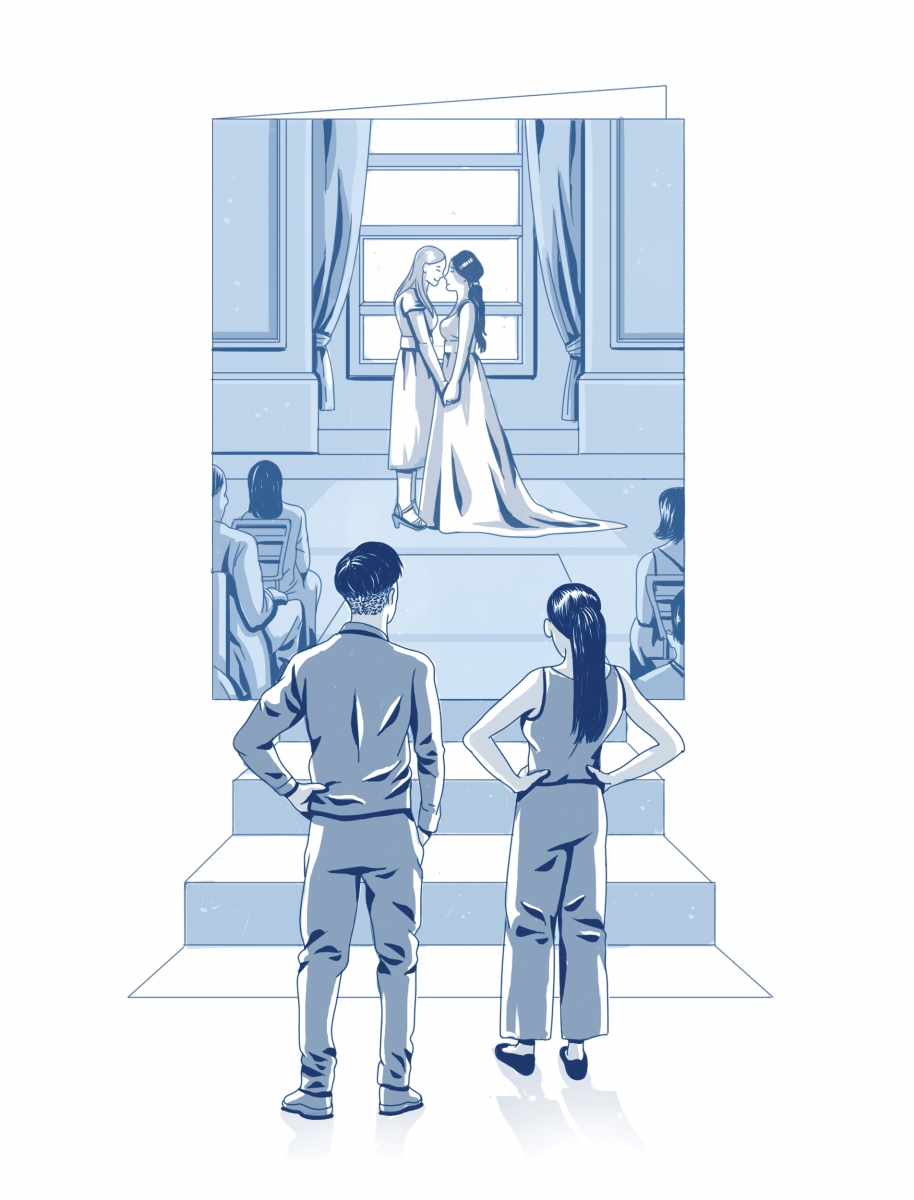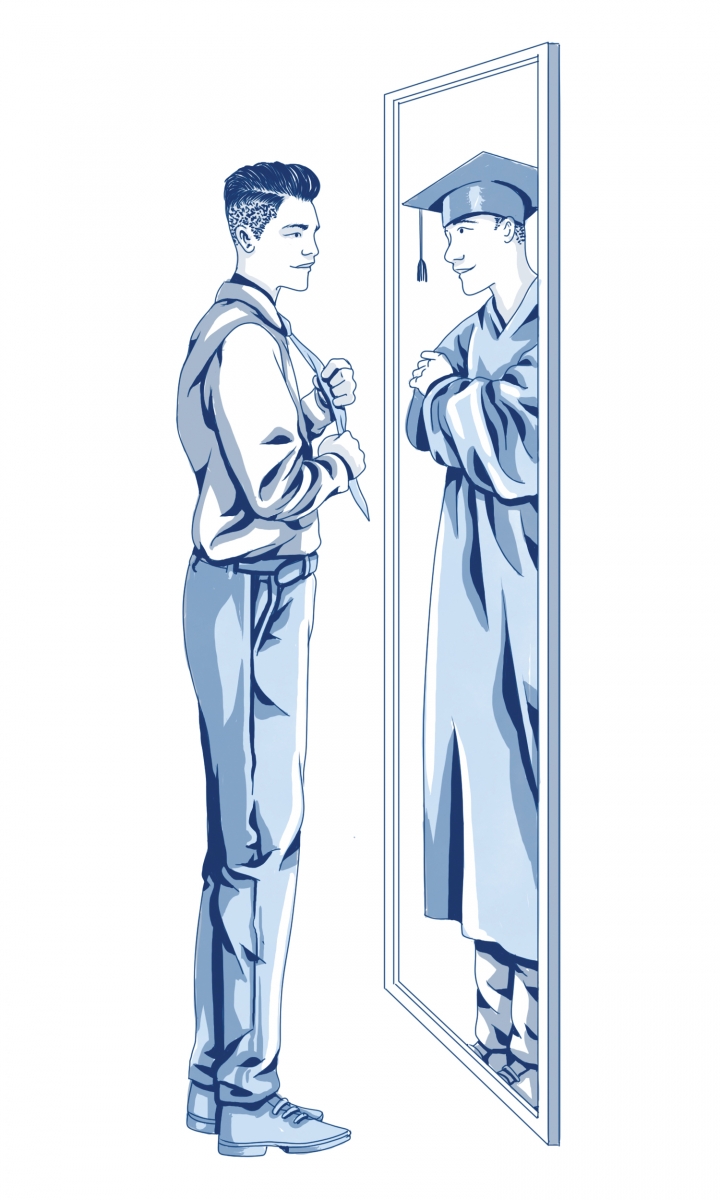You know the basic rules of how to be a top-notch wedding guest — the ones that have been passed down from relatives almost as warnings and urban legends. Don’t wear white. Don’t drink too much (even if it is an open bar). Don’t interrupt the ceremony by pounding on the church window and shouting “ELAINE” repeatedly, proceed to runaway with the bride, and then sink into regret at the back of a bus as Simon & Garfunkel’s “The Sound of Silence” softly plays in the background (à la Dustin Hoffman inThe Graduate).
Beyond these obvious faux pas, how have couples’ expectations for their guests changed in recent years as ceremonies shift out of tradition and into more casual events? As wedding planner and designer Jennifer Bergman shares, guests can stress less about the experience because the event’s focus is shifting more onto them. “Because I think people are getting married at older ages, it’s not how it used to be when weddings were about getting your household set up with coasters and dishes and things like that,” says Bergman. “Now it’s usually established couples and they’re not throwing a wedding to get gifts; they’re throwing a celebration and they want people to have an amazing time.”
Despite this, guests should still educate themselves on how to behave their best at weddings, and can follow the cues and etiquette that wedding experts have shared withAvenue.
As wedding ceremonies have become less strict, Bergman’s noticed that couples are also becoming less restrictive in how they expect their guests to dress. Terms like “black tie” or “formal attire” are falling out of fashion on invitations.
If you need direction on how to dress for the main event, though, she says you can take your cue for the formality of the event from the style of the invitation and the venue. “If the reception’s at a hotel bar or the Fairmont Hotel Macdonald, for example, there’s a different way to dress than if it’s at someone’s acreage outside,” she explains. “It seems obvious to a lot of us, but we do get people in jeans to pretty much most weddings — and khaki shorts.”
So keep the khaki shorts and jeans for those acreage weddings, but pull out your nice suit and tie or dress for those fancier venues and country clubs. Bergman says couples avoid the strict terms because their meanings have changed over the decades, and she thinks it’s better to make guests feel comfortable. And if you’re ever unsure how to dress, she recommends, “Just ask the couple or the extended family.”
Another tip on how to dress comes from Dawn Green, a marriage commissioner with over 1,200 weddings under her belt: Don’t upstage the bride. When Green dresses for weddings, she often wears plain but professional clothes so that the focus is not on her. Green admits this is a rare thing to happen: “I have not officiated very many weddings where there are a lot of difficult family dynamics like you see on TV, where the stepmother of the bride wears the dress that the mother of the bride wears.” But she does believe it’s important that guests are conscious their outfits won’t draw attention away from the happy couple’s efforts to look their best.
Weddings for some other cultures have also loosened up their dress expectations. Nisha Patel — a spoken-word poet and artist, who’s approaching professional wedding-guest status after attending dozens of weddings in her 25 years — has noticed this at the many Indian weddings she’s been to. As Indian weddings are often weeklong affairs with multiple events throughout, you often have to prepare several outfits to wear to different occasions. Patel is Gujarati, and they usually wear very colourful and intricate traditional clothing to the dances, but other styles of Indian clothes to the actual wedding.
According to Patel, for non-Indian guests, there’s no expectation to also wear Indian clothing. “I’ve seen some people dress in their own formal clothing,” she says, “which is a suit and tie or a nice dress, or they have dressed in Indian clothing that has been provided by the family.” Indian weddings are large community events — when people outside of the culture are invited, there’s no expectation for you to dress in a certain way unless you’ve already been gifted traditional clothes. Patel notes that even some young Indian men are opting for suits and ties, so a non-Indian person may not look too out of place if they show up in something similar.
Once you have your outfit sorted, Bergman’s top tip for guests is to make sure you plan your trip beforehand — particularly if you need to park in the downtown core — so that you can arrive on time. You should never assume a wedding will start late (even if your sister’s the bride and she’s never been on time for anything in her life). Bergman recommends, “Be there at least 15 minutes before the ceremony’s supposed to start.”
On that note, Bergman also says don’t assume the cocktail hour’s a casual event and show up to it close to the end. If cocktails start at 6 p.m. before the reception, strolling in 15 minutes after can be fine, but sometimes it can mess up the schedule if the event bleeds into the reception. “It can really affect the couple’s day to have their guests sneaking in at the last minute because that’s delaying their entrance; it’s delaying the dinner service. It makes them feel bad that people aren’t respecting them enough to show up on time for dinner.” Small efforts like punctuality can really help improve the mood and atmosphere of a wedding.
Related to time, Patel has a warning for people who’ve never attended an Indian wedding before: “You should be prepared for a lot of what feels like waiting.” As she explains, “There are a lot of very long ceremonies, there are very long speeches, and there are very long breaks in between stuff. So you should be prepared for that commitment because it isn’t going to be a ceremony that you can follow 100 per cent.” Often times there are parts of the ceremony that are in Sanskrit or Hindi, so even if you don’t understand those languages, you can be patient and attentive by remembering those moments are still significant to the couple and family.
Perhaps one of the greatest signs of our times is the need to remind people to be present at a wedding, which means stay off your cellphones. Not only does it appear rude to the couple who may be looking out at their guests during the ceremony or reception, but Bergman notes it will look bad in their pictures too to see a whole table of people with their heads down, texting. “You’re attending a very special once-in-a-lifetime event,” says Bergman. “Try to be as present as possible.”
You may think it goes without saying, but Green still needs to remind guests to silence or turn off their phones before she starts the ceremony. “If your cell phone rings in the middle of a wedding, don’t answer and don’t let it continue ringing. And if you must answer, don’t sit in your seat and talk. Can you tell this has happened to me?” she shares, her voice slowly quavering from lived frustration. Green says that guests around the badly behaving ones can be helpful if they step in and politely reprimand them for their behaviour.
However, during an Indian wedding ceremony, Patel notes that there are several moments throughout where you’re not expected to pay full attention because they’re mostly for close family, and you’re welcome to be quietly distracted in conversation. During these waiting periods, Patel says, “A fair number of people will stay seated, but they’ll chit chat amongst each other, and then a lot of people will be getting tea or standing at the back and talking to each other.” There are important moments that most people will know to pay attention to, such as the bride’s procession into the venue. Although some guests may not be familiar with all the stages, Patel has noticed that some weddings are starting to offer cue cards with a schedule for the ceremony to make it easier for guests to know how the day will run.
In her experience, Green says the guests that stand out for her are the ones who are willing to go above and beyond to help make a couple’s day extra special. She’ll always remember a young, sweet boy who was willing to run and fetch anything that was needed. “The couple were somewhat disorganized and needed an extension cord, and he said, ‘Oh, my dad has one in his trunk!’ And he went and got it,” she shares. “Later, the bride had something in her car and he said, ‘I’ll go get that for you.’ And he was just so helpful.”
All guests could take a page from this young wedding guest prodigy’s book, though Green has found that helpfulness is common among most guests. If the ceremony involves chairs that need to be put away after, she’ll ask guests if they wouldn’t mind helping by doing so. “And honestly, when I ask people to do stuff before the wedding, they will do it. People want to make the wedding happy and successful,” Green says, adding with a smile, “If I said, ‘After the wedding, stand on your heads and yodel,’ people would do that to the best of their ability.”
Here are some promises wedding experts recommend you make to the happy couple.
1.Look for ways to be helpful, whether it’s running an errand for the bride or helping clean up afterward.
2.Don’t interrupt the ceremony by shouting out an objection to the marriage if the officiant asks. It’s not funny; it’s annoying and delays the wedding.
3.Try to sit as close to the front as possible at the ceremony and avoid spreading out over the seats. It will make the wedding photos look that
much better.
4.Don’t try to move out of your assigned seats at the reception. You could screw up the dinner service as the kitchen has been pre-informed of allergies.
5.Be as present as possible, or in other words: Stay off your phone unless the couple has made a special request to live tweet or share photos on Instagram. (Though the latter can probably wait until the next day.)
This article appears in the January 2019 issue of Avenue Edmonton













